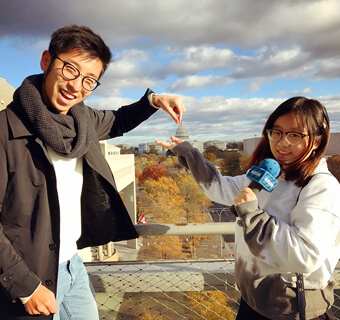NYU Shanghai encourages students to develop leadership skills and create ties to their communities. The Global Certificate Program enable students to achieve leadership, personal development, and involvement goals through coursework, volunteer work, and leadership experiences. Their requirements promote opportunities for teamwork, leadership, and community service, along with practical application of skills learned in NYU Global Network courses.
These certificates are challenging and students are advised to consider their coursework and extra-curricular commitments before attempting to earn one. Of the two certificates, the Certificate of Global Leadership has higher requirements, and fewer students earn this certificate.

A student who fits the profile for either of these two certificates will have achieved many of the listed requirements independently. The certificates provide some structure and guidance on how to complete any remaining requirements, and they are meant as a form of recognition for having achieved all requirements. Most students who are interested in obtaining these certificates will already be involved in student clubs and organizational leadership. The volunteer service requirements may be difficult to achieve on top of coursework and extracurricular activities, but they form an important aspect of the certificate.
- Use academic skills and knowledge in practical, results driven, non-academic experiences -- The skills that students gain through an academic curriculum can be supplemented through service activities that allow them to use these skills to achieve meaningful results.
- Develop leadership -- Through service activities, students can significantly enhance leadership skills. Service projects allow students to develop a true understanding of the importance of leadership in achieving objectives alongside their teammates. Service projects also allow students to collaborate with other students and to develop leadership skills.
- Develop professional networks -- Service is a valuable way to enhance professional networks. Service activities allow students to gain access to leaders, managers, and key individuals in an organization. Service allows students to gain first-hand experience and insight from these professionals and to add them to their own network of professional references.
- Foster community involvement and social responsibility -- Community involvement and social responsibility are critical areas for the development of leadership. In most organizations, these are now critical competencies for senior managers. Service projects allow students to build an understanding of the importance of these ideas at an early stage in their careers.
All materials needed to complete these certificates must be submitted by April of the student’s senior year. Students will be certified as having met the criteria by a committee of faculty, Academic Affairs staff, and Student Life staff. The number of students who may receive the Certificate of Global Leadership is limited to 15 percent of that year’s graduating class; there is no limit to the number of students who may earn the Certificate of Global Citizenship. If you have any questions, please contact shanghai.advising@nyu.edu.
Certificate of Global Leadership

Students may declare their intention to pursue the Global Leadership Certificate by filling out this form by the end of their sophomore year. Coursework done prior to a declaration of intent will count toward the certificate. Non-course work, volunteer, and leadership experiences can only count toward the certificate following a declaration of intent.
Requirements 1-5 expand on the Core Curriculum into the higher level of quantitative skills, economic and political awareness, and historical and cultural understanding required of global leaders. Requirements 1-2 may be double-counted as core curriculum courses, but requirements 3-5 can only be double counted as major or minor classes. Refer to the Global Certificates Course Requirement document to see examples of courses that fulfill these requirements.
- 1. Calculus or higher math class
- 2. Programming or computational thinking
- 3. International relations, comparative politics, or microeconomics
- 4. Transnational history course
- 5. Cross-cultural literature course
Requirements 6-7 recognize that effective global leaders are often fluent in more than one language, and have life experiences outside of studying at an American university in China. Requirement 7 calls for additional Chinese language courses for international students if they are not fluent in a third language, and requirement 6 calls for all students to spend at least one semester of study away in Europe, Africa, South America, or Australia. If a student’s major limits their study away options to New York, then they may still meet this requirement by completing a summer internship outside of Asia or North America.
- 6. Two study away semesters, one of which must be outside of Asia and North America.
- 7. Competency in a second language at an advanced or higher level. (Competency does not have to be demonstrated by coursework. Students already fluent in a second language may use that language to fulfill this requirement.)
Requirements 8-11 promote the idea of leadership as service. A global leader should have practical experience in leadership as an undergraduate, both inside the classroom and outside of it.
- 8. At least 150 involvement hours in clubs and service projects. Involvement hours should be documented in NYU Engage.
- 9. Two letters of recommendation, one from faculty and one from Student Life (submitted in spring of your senior year).
- 10. Reflection paper* (submitted in spring of senior year)
- 11. The reflection paper will be posted to a public forum, and students will make presentations about their experience earning the certificate at a public event.
*Note on the Reflection Paper:
The reflection paper should substantively address what the student has gained from their required courses, study away experiences, and participation in volunteer service. Essays for the Global Citizenship Certificate should be 5-7 pages long, and those for the Global Leadership Certificate should be 8-10 pages, 12-pt font, double-spaced, typed. The essays should be more than a narrative of your efforts to meet the certificate requirements. They should focus on outcomes rather than the journey, and will be evaluated according to the following objectives:
- Impact – How did the student’s involvement hours significantly affect the accomplishment of an organization’s goals?
- Education – How did the certificate requirements fit into the student’s overall education at NYU Shanghai?
- Personal Growth – What did the student gain personally from the experience?
Certificate of Global Citizenship
Students may declare their intention to pursue the Global Citizenship Certificate by filling out this form by the end of their sophomore year. Coursework done prior to a declaration of intent will count toward the certificate. Non-course work, volunteer, and leadership experiences can only count toward the certificate following a declaration of intent.
Students who successfully complete the items below will receive a Global Citizenship Certificate:
Requirements 1-3 expand on the Core Curriculum into the higher level of economic and political awareness, and historical and cultural understanding required of global citizens. These requirements cannot be double-counted as core curriculum courses, and can only be double-counted as major or minor classes. Refer to the Global Certificates Course Requirement document to see examples of courses that fulfill these requirements.
- 1. International relations, comparative politics, or microeconomics
- 2. Transnational history course
- 3. Cross-cultural literature course
Requirements 4-5 recognize that effective global citizens are often fluent in more than one language, and have life experiences outside of studying at an American university in China. Requirement 5 calls for additional Chinese language courses for international students if they are not fluent in a third language, and requirement 4 calls for all students to spend at least one semester of study away in Europe, Africa, South America, or Australia. If a student’s major limits their study away options to New York, then they may still meet this requirement by completing a summer internship outside of East Asia or North America.
- 4. At least one study away semester outside of East Asia and North America.
- 5. Competency in a second language at an intermediate or higher level. (Ccompetency does not have to be demonstrated by coursework. Students already fluent at this level in a second language may use that language to fulfill this requirement.).
Requirements 6-8 promote the idea of citizenship as service. A global citizen should have practical experience in leadership as an undergraduate, both inside the classroom and outside of it.
- 6. At least 80 involvement hours in clubs and service projects. These should be documented in NYU Engage.
- 7. *Reflection Paper (submitted in spring of senior year)
- 8. The reflection paper will be posted to a public forum.
*Note on the Reflection Paper:

The reflection paper should substantively address what the student has gained from their required courses, study away experiences, and participation in volunteer service. Essays for the Global Citizenship Certificate should be 5-7 pages long, and those for the Global Leadership Certificate should be 8-10 pages, 12-pt font, double-spaced, typed. The essays should be more than a narrative of your efforts to meet the certificate requirements. They should focus on outcomes rather than the journey, and will be evaluated according to the following objectives:
- Impact – How did the student’s involvement hours significantly affect the accomplishment of an organization’s goals?
- Education – How did the certificate requirements fit into the student’s overall education at NYU Shanghai?
- Personal Growth – What did the student gain personally from the experience?

